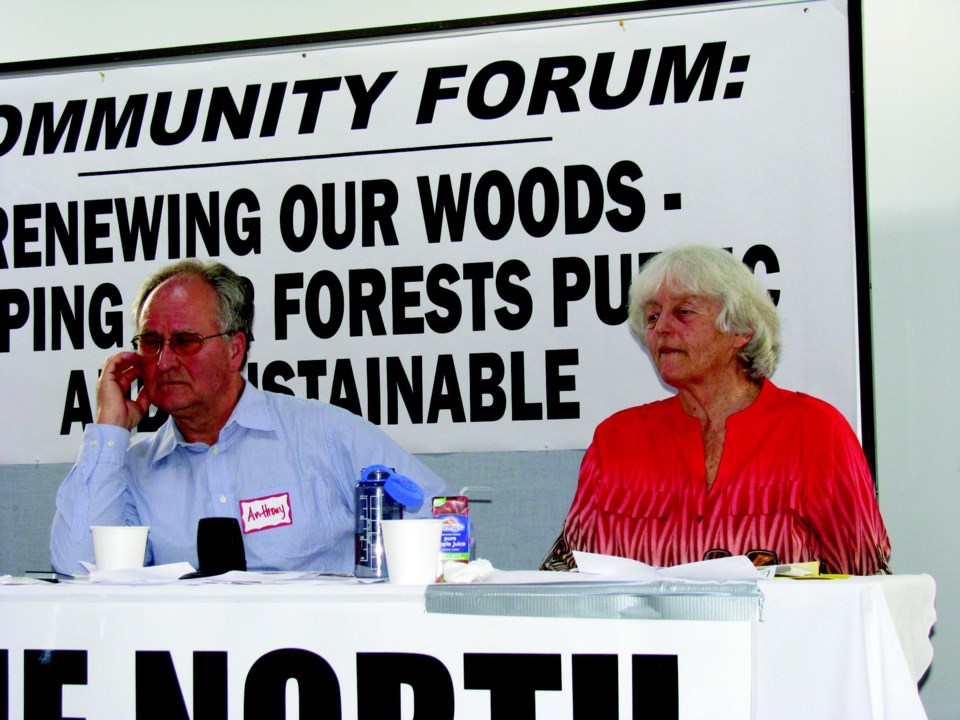The Stand Up for the North Committee hosted a forum on Saturday to voice concerns about the current state of forest management in B.C., and proposed changes to the forest tenure system.
Approximately 200 people came out to hear from First Nations, labour leaders, forestry policy analyst Anthony Britneff and noted environmentalist Vicky Husband.
Britneff is a former senior forester with the B.C. Ministry of Forests and Range. He retired in 2010 after 40 years with the agency, and has been speaking out about what he calls "a perfect storm of mismanagement."
Britneff said the provincial government slashed funding for the B.C. Forest Service -reducing the number of district offices from 42 to 21 and eliminating over 1,000 jobs - between 2001 and 2010.
"Most programs were cut so badly departments are now dysfunctional," Britneff said.
And on Jan. 31, 2004 the Forests and Range Practices Act came into effect, he which further cut legal oversight of forestry companies in favour of relying on forestry professionals employed by forestry companies.
On March 24, NDP forestry critic Norm Macdonald questioned the why Canfor and West Fraser were able to over harvest almost a million cubic metres of healthy trees not effected by the mountain pine beetle in the Morice Timber Supply Area between 2008 and 2013.
Britneff said the companies are still operating in the Morice area and have basically gotten away with a slap on the wrist.
"In 2012 185 per cent of the partition [in the Morice TSA] was harvested - the spruce, balsam... that's your midterm timber supply. How can forest professionals hold companies accountable if over harvesting is lawful?" he said. "The Forest Practices Board is only mandated to audit based on provincial law. Let me assure you, your forests are not sustainably managed- the law does not allow it."
These changes happened at the same time the province was dealing with the single largest impact of climate change the province has felt: the mountain pine beetle epidemic, he said.
"In 2008, the chief forester asked for a report on climate change. It was done in March, 2009," he said.
The report, which was not widely distributed, concluded that timber supply would be significantly impacted by tree deaths caused by diseases, competition from foreign species moving in and climatic factors, he said. Little action was taken on the plan, Britneff added.
"The forestry ministry now uses the science of convenience," he said.
On April 1, Forests, Lands and Natural Resource Operations Minister Steven Thomson announced a public consultation on a proposal to increase area-based tenures and tree farm licences. The consultation runs until May 30.
"This process is not a public consultation at all. It's the government asking for feedback on what it plans to do," he said.
The goal of switching to an area-based system or tree farm system is that companies would have more incentive to invest in sylviculture and management of areas that they have exclusive harvesting rights too. Under the current system, the majority of forest tenures are volume-based -meaning companies have the right to harvest a certain amount of wood from a particular Timber Supply Area.
"I must be fair on the quality of management of tree farms, the quality varies," Britneff said.
However, tree farms have the highest rate of waste of any of the management categories in the province, he said.
"Tree farm licences are not the way to go. The [tree farm licence] rollover is about privatizing profits, but socializing the costs," he said.
The province subsidizes tree farm operators' costs of fire management - if the fire starts in adjacent public forest - road construction and other costs, he said.
Husband, who has received the Order of Canada and Order of B.C. for her environmental advocacy, said B.C.'s forests should be managed as ecosystems -not just as trees to be harvested for profit.
"Really we haven't managed our public ecosystems well. I've done some work on the [Atlantic] cod fishery. The cod fishery was the most productive in the world, and we killed it," she said. "I'm afraid we're doing the same to our forests."
Even though tree farm licensees are supposed to allow recreational access through their areas, there is plenty of gates and lack of access when tree farm licenses are issued, she said.
"We have a lot of experiences with tree farms on the coast, and it's not good. It is the privatization of our forests," she said. "The timber comes first and nothing else matters."
Keeping public forests public is a start, she said, and then enforcement of the current rules needs to be enhanced until stronger regulations can be drafted.
"We have an unenforceable forest act... none of the ecological values are being protected either," she said. "There is nobody looking after the public interest."
The number of field inspections conducted by forestry staff dropped from more than 25,000 in 2002 to less than 8,200 in 2012, she said- and a special report by the Forest Practices Board last year said field inspections have continued to decline since then.
Peter Ewert, spokesperson for the Stand Up for the North committee, said the long-term health of the forest is critical to communities in the North reliant on the forestry industry.
"We are here today because we are concerned," Ewert said. "There are many problems facing the forest and the forestry industry. Problems that are not being addressed by the powers that be. There is a growing sentiment out there in B.C. that we want more control at the local level on what is happening to our forests."



